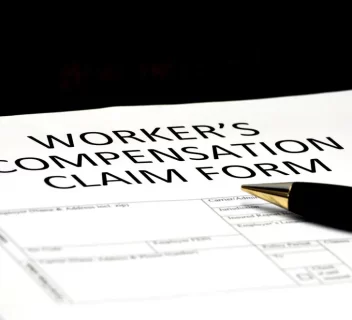When to File a Workers’ Compensation Claim: Key Deadlines and Advice
Got injured at work and wondering when to file a workers’ compensation claim? Timing is everything. Filing your claim right away ensures you have the opportunity to try and secure the medical care and financial support you need. In this article, you’ll learn about the critical deadlines, step-by-step filing process, and ways to avoid common mistakes.
Key Takeaways
- Timely filing of workers’ compensation claims is essential to ensure coverage and avoid disputes with employers and insurers, with strict deadlines often applied by state regulations.
- Notifying your employer immediately in writing after an injury is crucial for documenting the incident and initiating the workers’ compensation process.
- Consulting a workers’ compensation lawyer can improve outcomes by maximizing benefits, guiding through the claims process, and protecting against employer retaliation.
Importance of Timely Filing
Wondering “when to file a workers’ compensation claim?” It is critical to file a workers’ compensation claim swiftly after an injury. The initiation of the claims process starts immediately following the occurrence of an injury, and quick action guarantees that medical expenses are covered and benefits commence without delay. Postponing the submission could lead to disagreements with employers or insurance companies regarding the validity of your claim, potentially causing stress and jeopardizing the receipt of benefits during recuperation.
State laws often mandate specific deadlines for submitting these claims. Prompt attention is imperative. In places like Georgia, if your employer assumes responsibility for medical treatment costs, you may have up to two years to file a workers’ compensation claim. It’s recommended to act quickly instead of waiting, since procrastination can threaten eligibility for benefits. This holds true even when injuries appear minor at first glance, but later escalate in severity—delaying filing under such circumstances might mean forfeiting certain entitlements.
Filing early not only circumvents clashes with employers and insurers but also helps facilitate a more fluid claiming experience while safeguarding your rights as someone who has been injured on the job. An expeditious filing lets you access entitled support sooner, including healthcare services, along with remuneration for any income lost due to inability to work.
In essence, immediate action is paramount when dealing with workplace injuries—it serves as both a foundational move towards securing necessary aid as well as guaranteeing uninterrupted assistance throughout recovery.
Notifying Your Employer
Along with when to file a workers’ compensation claim, if you suffer an injury or illness related to your job, it is critical that you inform your employer as soon as possible. Promptly reporting the incident provides a solid foundation for initiating your workers’ compensation claim, and establishing formal documentation is advisable. To create an official record, send written notification—either through letter or email—to someone in authority, like a supervisor, manager, or human resources representative, including specific details such as the date and time of the injury, along with how it occurred. This secures your rights concerning any work-related injuries.
Following being notified of such incidents, employers have an obligation to document them by filing an official report with their insurance company—a step necessary to commence the process of obtaining workers’ compensation benefits officially. If there’s neglect on the part of the employer in recording these incidents accurately, creating a detailed personal account becomes imperative for maintaining clarity should there be disputes or complications later.
It’s also important to keep informing your employer about updates regarding changes in medical status post evaluations regularly. Doing so guarantees they are up-to-date about shifts in work ability due to employment-related health issues, which may necessitate alterations in responsibilities at work or extra support if needed.
By ensuring timely and precise reporting mechanisms connecting illness/injury occurrences directly with professional tasks performed, claims made while seeking out appropriate workers’ compensation benefits available under legal entitlements.
Filing the DWC-1 Form
Initiating a workers’ compensation claim necessitates the completion and submission of the DWC-1 forms. It is imperative that these forms are filled out with precision, as they provide crucial details about your injury for both your employer and their insurance company to review.
Ensure you hand over your section of the DWC-1 form to your employer within one year of when the injury occurred. Failing to do so can lead to rejection based on expiration according to statutory limitations. Swift action in submitting this document is essential because delays could significantly complicate or even result in a denial of your claim. Your employer has an obligation to furnish you with this form promptly, no later than one working day after being informed about your injury.
In navigating through the filing intricacies associated with DWC-1 forms, it may be beneficial for individuals going through such processes to seek counsel from a knowledgeable workers’ compensation lawyer. A legal professional assists not only in ensuring meticulous completion and timely submission but also provides indispensable assistance throughout by helping gather necessary documentation and offering advice during each stage of filing the claim.
Upholding thoroughness and promptness cannot be overstated—they play critical roles in establishing a successful claims process where all requirements are fulfilled adequately enough that an approval becomes feasible following a request via mail.
Exceptions to Filing Deadlines
There are strict filing deadlines for workers’ compensation claims, yet certain exceptions can permit overlooking the specific deadline. Recognizing these exceptions is crucial in safeguarding your entitlements and preserving future benefits. For example, if you were incapacitated or initially unaware of the seriousness of your injury, such reasons may warrant a postponement in submitting your claim.
Overlooking the stipulated deadline could jeopardize eligibility for workers’ compensation benefits. Nevertheless, awareness of these exceptions might offer some flexibility. Should you suspect that an exception applies to your situation after missing a deadline, it’s advisable to seek counsel from a lawyer experienced with workers’ compensation cases. They can help decipher complex rules and aim to keep your claim valid.
Employing these exceptions effectively could make a significant difference when managing statements associated with exposure-related claims or other issues that surface.
Medical Treatment and Documentation
Following an injury, it is imperative to obtain medical care. In the state of Georgia, workers who sustain injuries on the job are entitled to receive medical treatment that falls under workers’ compensation insurance coverage at no personal expense. To ensure this coverage applies, select a physician from your employer’s approved panel of doctors unless such a panel does not meet specific criteria. Addressing your health concerns swiftly after being injured is crucial.
For a successful workers’ compensation claim in Georgia, maintaining detailed records of all medical treatments received is essential. Supply your employer with updates, including doctor’s reports and prescriptions, each time you visit healthcare providers for treatment related to work injuries or illnesses. This accurate record-keeping demonstrates both the severity and scope of your condition, which proves vital during the claims process.
Should there be any dispute resulting in the denial of your initial claim for benefits, you have latitude in choosing another doctor outside those listed by your employer’s provided selection for continued care. Under Georgian law, when injured employees find themselves unsatisfied with their initial medical provider, they possess rights granting them one chance to find more suitable caregivers aligned better with their recovery needs post-injury or illness.
Keeping meticulous documentation regarding all procedures related to treating workplace-related afflictions will facilitate explanations pertinent to claims discussions while striving towards securing justly due benefits through workers’ compensation avenues.
Workers’ Compensation Benefits Available
Workers’ compensation offers various benefits to injured employees, including income benefits for those unable to work for more than seven days. If an injury forces a lower-paying job, reduced benefits are available for up to 350 weeks. Medical benefits cover all authorized treatments related to work injuries, including hospital bills and physical therapy for an injured employee.
For catastrophic injuries, workers may qualify for lifetime medical benefits. Permanent disability benefits are available based on the disability’s severity determined by the treating physician. Dependents of deceased employees can receive compensation based on a percentage of the worker’s average weekly wage. These comprehensive benefits ensure injured workers receive the necessary support to recover and manage their injuries.
Workers’ compensation is designed to provide wage replacement and medical benefits to employees after a work injury. Understanding the available benefits helps navigate the claims process and ensures you receive workers’ compensation benefits. Workers’ compensation aims to support injured workers through recovery and return to work, whether it’s compensation for lost wages, medical expenses, disability benefits, or rehabilitation from a workers’ compensation insurance carrier.
Consulting a Workers’ Compensation Lawyer
Seeking advice from a lawyer specializing in workers’ compensation can significantly influence the success of your claim. Attorneys are instrumental in ensuring you secure all entitled benefits, such as coverage for medical bills and recouping lost wages. In instances where your claim is rebuffed, an attorney provides expert guidance through the appeals process and compiles robust evidence to substantiate your position.
In situations involving third-party liability, a lawyer can assist with pursuing supplementary legal actions alongside your primary workers’ compensation case, guaranteeing that you obtain rightful compensation from all applicable sources. Engaging a lawyer alleviates the burden of managing claims by yourself and permits you to dedicate energy toward recuperation while they work out equitable settlements, mindful of potential long-term healthcare needs.
Having an attorney safeguards against any retribution from employers as a consequence of filing for workers’ compensation benefits. Seeking counsel from attorneys well-versed in the distinctive aspects of each worker’s compensation scenario is advantageous. They provide crucial understanding regarding your entitlements and facilitate an efficient resolution to securing those advantages during the claiming journey.
Contact 1-800-THE-LAW2 today for a free consultation with a workers’ compensation lawyer in our professional network. During this consultation, you’ll be able to discuss when to file a workers’ compensation claim, get a case evaluation, and receive guidance on how best to proceed with your claims.
Tracking Your Claim Status
It is essential to keep abreast of the status of your workers’ compensation claim. In Georgia, the eCase system provides an electronic avenue for individuals to keep tabs on their claims, delivering instant updates and alerts so that any problems or delays can be dealt with swiftly.
The tools provided by the Georgia State Board of Workers’ Compensation, such as eCase, aim to bolster openness and improve communication regarding the development of your claim. Utilizing eCase allows you to monitor your workers’ compensation claim online as it advances through various stages, which helps in tempering expectations and alleviating stress related to awaiting news on progress.
By consistently reviewing where your claim stands, you are better equipped to confront potential difficulties head-on. Should a denial or delay occur with your workers’ compensation benefits, being informed about its current state enables swift action—be it submitting additional evidence or seeking advice from a lawyer—to prevent forfeiting coverage or losing out on entitled benefits because issues were not promptly tackled.
Summary
Navigating the workers’ compensation claim process can be complex, but understanding each step can make a significant difference in ensuring you receive the benefits and support you need. From timely filing and notifying your employer to seeking medical treatment and tracking your claim status, every step is crucial. Knowing your rights and the benefits available helps you make informed decisions throughout the process.
The key takeaway is to act promptly and stay informed. Whether it’s filing the DWC-1 form, consulting a lawyer, or using tools like eCase, being proactive can help you manage your claim effectively. Remember, workers’ compensation is designed to support you through your recovery and return to work. Ensuring you understand the process and take the necessary steps will help you navigate this challenging time more smoothly.
Frequently Asked Questions
The first step after a work-related injury is to notify your employer immediately, preferably in writing, to ensure there is a formal record of the incident. This helps protect your rights and facilitate any necessary follow-up actions.
You must file your workers’ compensation claim within 30 days of the injury to ensure it is not denied due to the statute of limitations.
Timely submission is crucial for your claim’s success.
Missing the filing deadline can result in the denial of compensation benefits; however, certain exceptions may apply that could justify a delay.
You can generally choose your own doctor for treatment in Georgia only if the panel of physicians provided by your employer is invalid or if your claim is denied.
Otherwise, you must seek treatment from a doctor within your employer’s designated panel.
An attorney specializing in workers’ compensation can greatly improve your benefits and guide you through the appeals procedure should your claim be rejected, while also protecting you from any possible retribution by your employer.
Such a lawyer’s proficiency guarantees that you obtain the necessary assistance and remuneration to which you are entitled.




